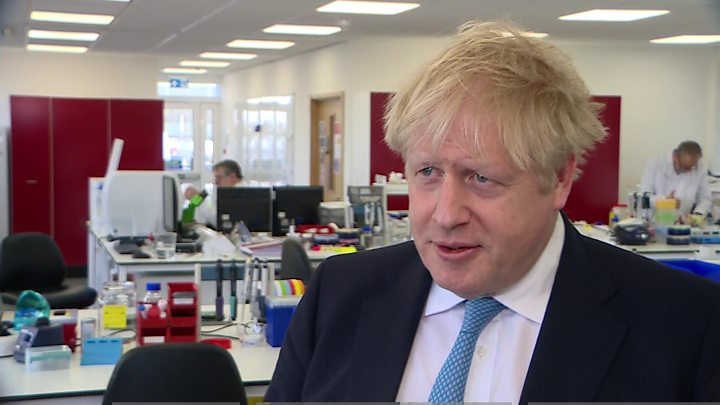
Media playback is unsupported on your device
The UK government has promised an extra £46m in the fight against coronavirus.
The money will include funds towards the development of a vaccine and a new a rapid test for the disease.
There is currently no vaccine available to protect people against Covid-19, but Prime Minister Boris Johnson said he hoped one would be ready in about a year.
Support will also be offered to some of the countries most vulnerable to a coronavirus outbreak.
It comes as the number of cases in the UK rose by 48 – the biggest increase in a single day – taking the total number to 163.
The new funds were announced as Mr Johnson visited a laboratory in Bedfordshire where the new rapid test, which could provide results within 20 minutes, is being developed.
Similar to a pregnancy test, it would use a swab of saliva or a pinprick of blood. The lab already has experience of creating similar tests for Ebola, yellow fever and measles.
Existing tests can take a couple of days to provide results, as they rely on samples being sent away to a lab for analysis.
But the test could still be six months away.
Funding will also go towards work on eight possible vaccines in development as well as further research.
Government scientific advisers have already warned a working vaccine is unlikely to be ready in time for this current outbreak.
Prime Minister Boris Johnson, who visited Mologic lab, said in a statement: “Keeping the British people safe is my number one priority, and that’s why I’ve set out our four-part plan to contain, delay, mitigate and research coronavirus.
“We are ensuring the country is prepared for the current outbreak, guided by the science at every stage. But we also need to invest now in researching the vaccines that could help prevent future outbreaks.
“I’m very proud that UK experts – backed by government funding – are on the front line of global efforts to do just that.”
The government’s chief scientific officer, Sir Patrick Vallance, said: “Rapid testing is going to be key to managing this outbreak, but ultimately vaccines are going to provide the long-term protection we need.
“The UK has some of the world’s leading scientists and this money will help in our fight to tackle this new disease.”
The announcement takes the total amount of money committed by the government to spending on coronavirus to £91m.
The new £46m comes from the UK’s aid budget and includes up to £16m to help some of the most vulnerable countries prepare for the coronavirus.
The UK’s contribution to vaccine research now stands at £65m.
Global human trials of the eight possible vaccines could start later this year but firms would still face the task of mass-producing and distributing them.
It comes as the government is under pressure to explain its plans for ensuring food supplies, as supermarkets report sales of basics going “through the roof”.
Health Secretary Matt Hancock told a BBC Question Time audience he was “absolutely confident” food supplies would not run out, amid concerns people were stockpiling.
He said the government was working with supermarkets to ensure food and supplies could get to people in self-isolation.
But a supermarket executive told the BBC sales of cupboard basics had “gone through the roof” and he was not sure the government could guarantee food supply in all instances.
He also denied the government had been in contact about ensuring supplies for self-isolators.
In other developments:
- A cruise ship carrying 142 UK nationals – including 21 crew members – has been prevented from docking in San Francisco while tests are carried out
- Two British Airways staff have tested positive for the virus. They are reported to be baggage handlers
- Visitors to Northampton General Hospital have been stealing hand sanitising gel daily, health bosses said
- A church in Devon has been closed for a deep clean after a parishioner tested positive and a Hare Krishna temple near Watford has also closed because of a coronavirus case amongst its congregation
- Starbucks has banned reusable cups in attempt to prevent the spread of the virus
Speaking to reporters on Friday, Mr Johnson said he anticipated a “substantial period of disruption” in the UK as a result of the coronavirus.
“How big that will be, how long that will be I think is still an open question, but clearly it is something we’re going to have to deal with for quite a while here in the UK.”
More than 92,000 cases have been recorded worldwide, with 80,552 in China, where the virus originated. China also accounts for the vast majority of deaths – 3,042 to date.
